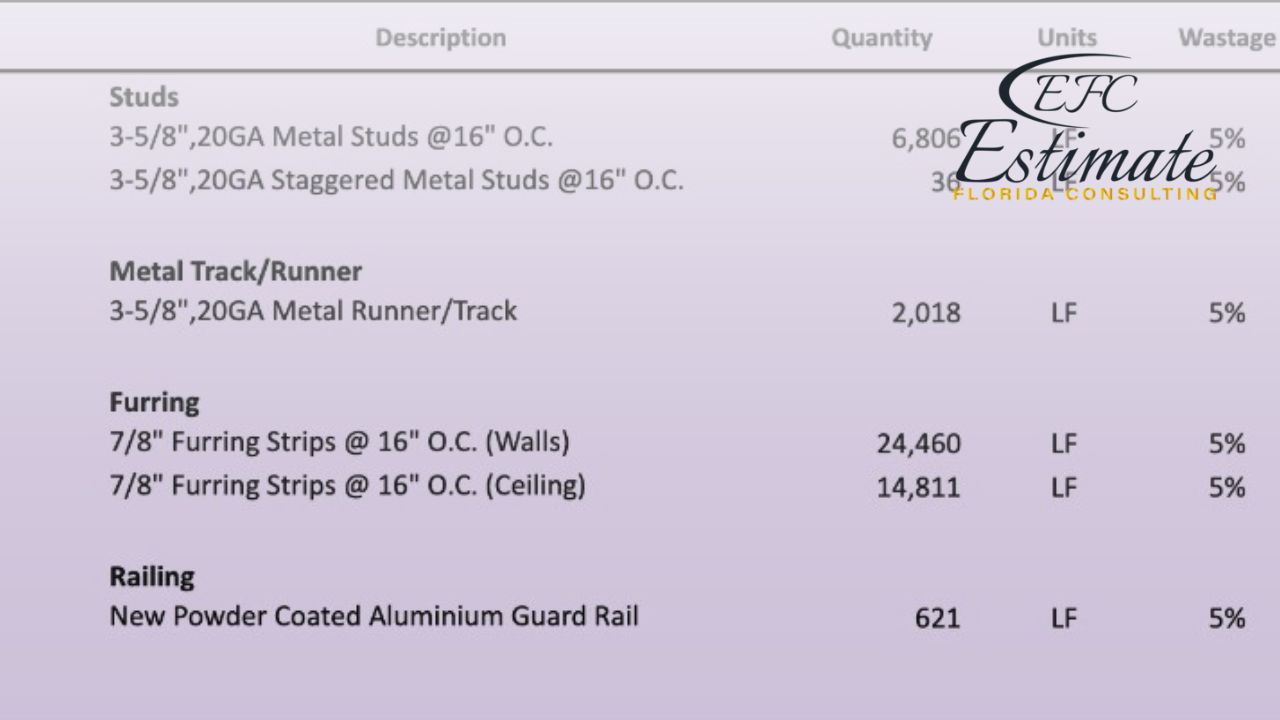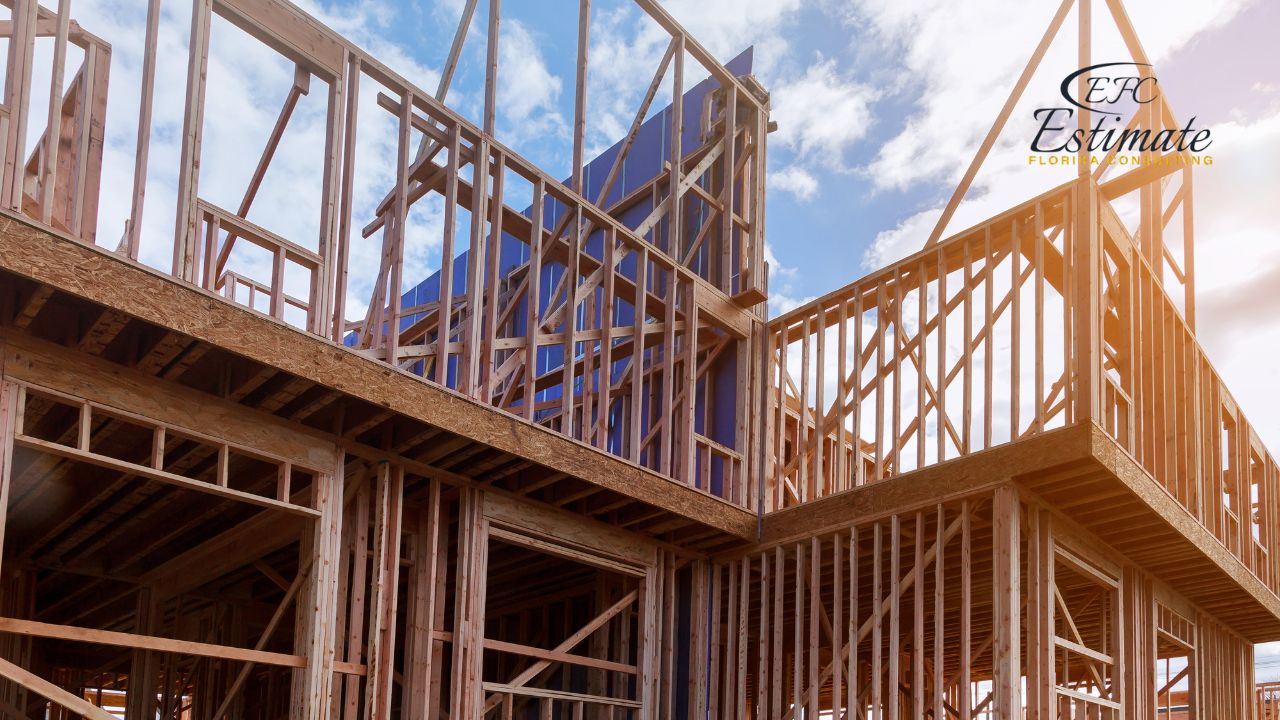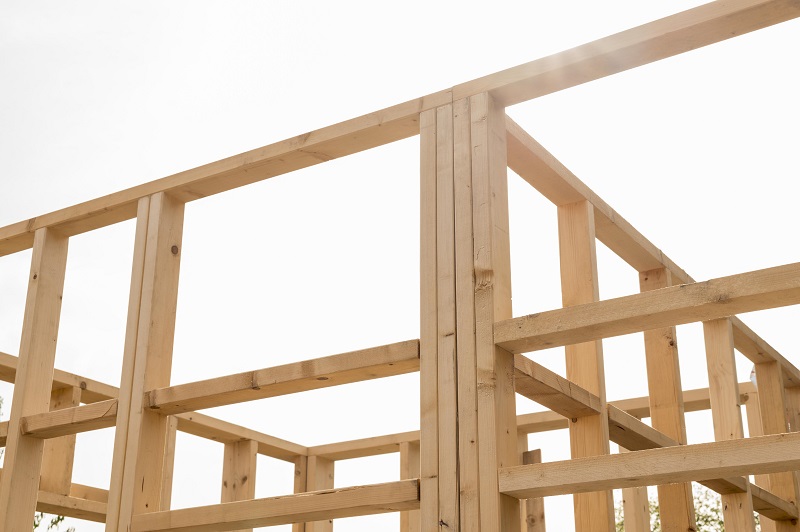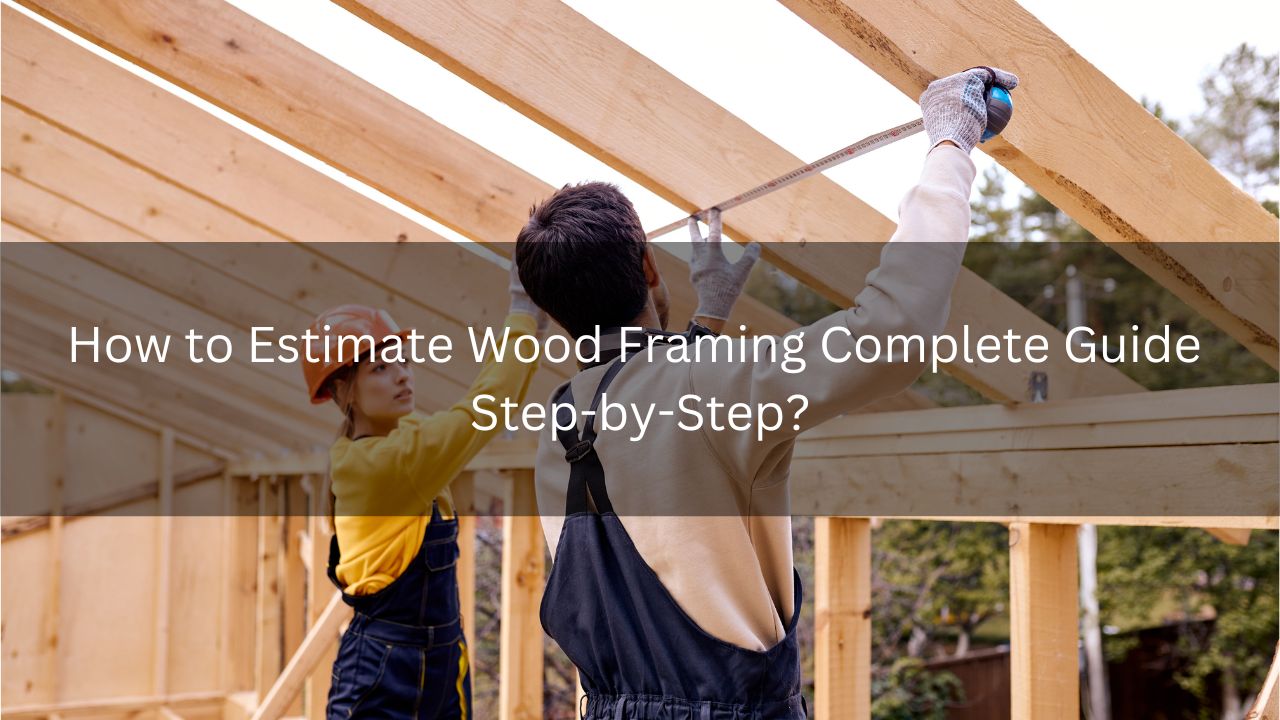Lumber Cost Estimator in Jacksonville, FL
Estimate Florida Consulting offers expert lumber cost estimation services in Jacksonville, with estimates typically ranging from $140,000 to $210,000. Our cost per square foot is calculated to be between $9.56 and $12.15. Catering to various projects from renovations to new constructions involving lumber, we ensure precise and comprehensive cost assessments to aid in effective budgeting. Our team employs state-of-the-art techniques and in-depth industry knowledge to provide estimates tailored to your unique project requirements. We are dedicated to providing exceptional service, helping our clients in Jacksonville navigate the financial aspects of their lumber-based projects with confidence and clarity.
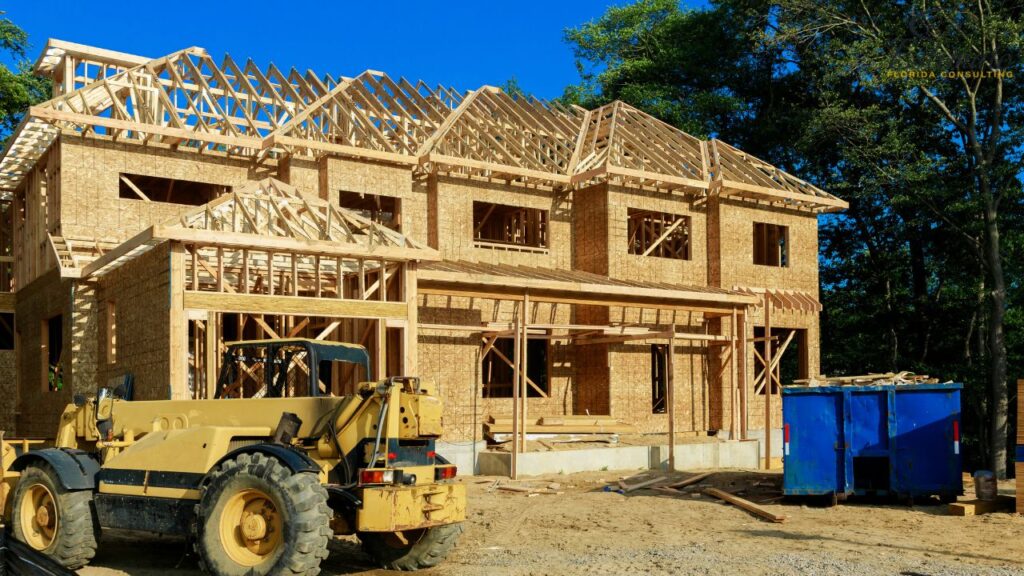
Cost to Install Wood Siding Over Existing Siding
As a Lumber Cost Estimator, it’s essential to consider the various factors involved in installing wood siding over existing siding materials rather than starting from scratch. While this approach can save time and resources, it’s crucial for contractors to assess the integrity of the current siding closely. Rotted or damaged siding pieces cannot be covered up with new ones as it may lead to structural issues. Certain materials, like vinyl siding, must be removed before new installations due to their softness and susceptibility to damage if covered over. Understanding which sidings can support wood siding installations helps ensure a smooth and structurally sound transition, ultimately impacting cost estimations for lumber-related projects.
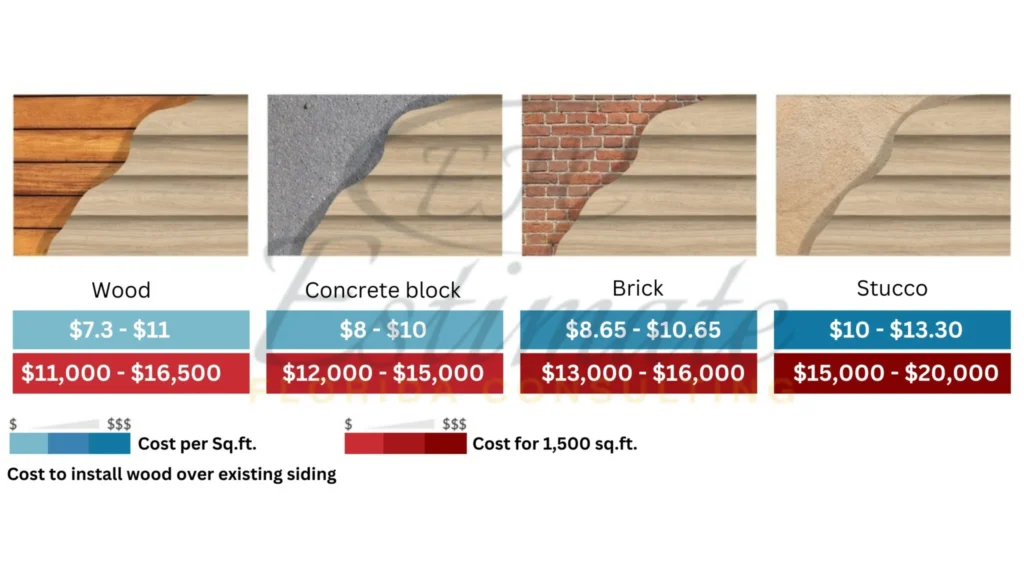
| Existing Siding | Cost per Sq.Ft. (Installed) | Cost for 1,500 Sq.Ft. (Installed) |
|---|---|---|
| Wood | $7.30 – $11 | $11,000 – $16,500 |
| Concrete Block | $8 – $10 | $12,000 – $15,000 |
| Brick | $8.65 – $10.65 | $13,000 – $16,000 |
| Stucco | $10 – $13.30 | $15,000 – $20,000 |
90% More Chances to Win Projects With Our Estimate!
- Multi-Family Building
- Hotel Building
- Hospital Building
- Warehouse Building
- School & University Building
- High-Rise Building
- Shopping Complex
- Data Center Building
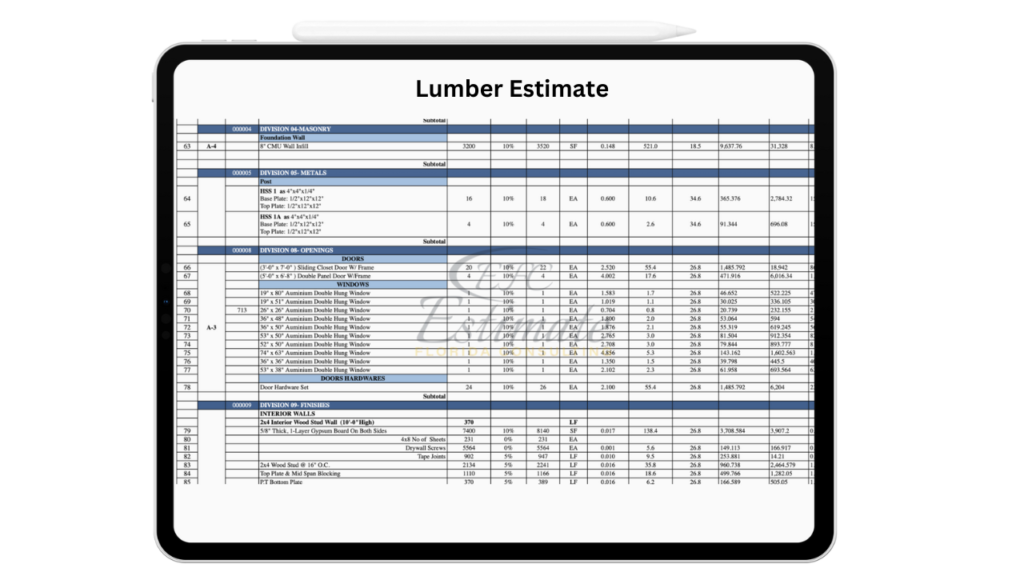
Cost Breakdown for Lumber
A detailed understanding of the cost breakdown for lumber is essential for accurate budgeting and project planning. This breakdown includes various significant components such as raw material costs, transportation fees, labor expenses, and overhead costs. Additionally, external factors like market demand and supply dynamics greatly influence these costs, making them variable and dependent on current market conditions.
Here’s a detailed breakdown of these costs:
Cost Component | Cost |
Raw Material | $90,000 |
Transportation | $15,000 |
Labor | $80,000 |
Overhead Expenses | $25,000 |
Factors Affecting Lumber Costs
Several factors significantly influence the cost of lumber for construction and woodworking projects:
Wood Type
The type of wood selected plays a crucial role in both cost and the outcome of the project. Softwoods like pine and cedar are popular choices due to their affordability and availability. They are frequently used in framing and outdoor structures. On the other hand, hardwoods such as oak and maple are more expensive but offer greater durability and aesthetic appeal, making them ideal for high-end furniture and flooring. The decision between softwoods and hardwoods should be based on the project’s budget, specific requirements, and desired aesthetic qualities, as each type has its unique benefits.
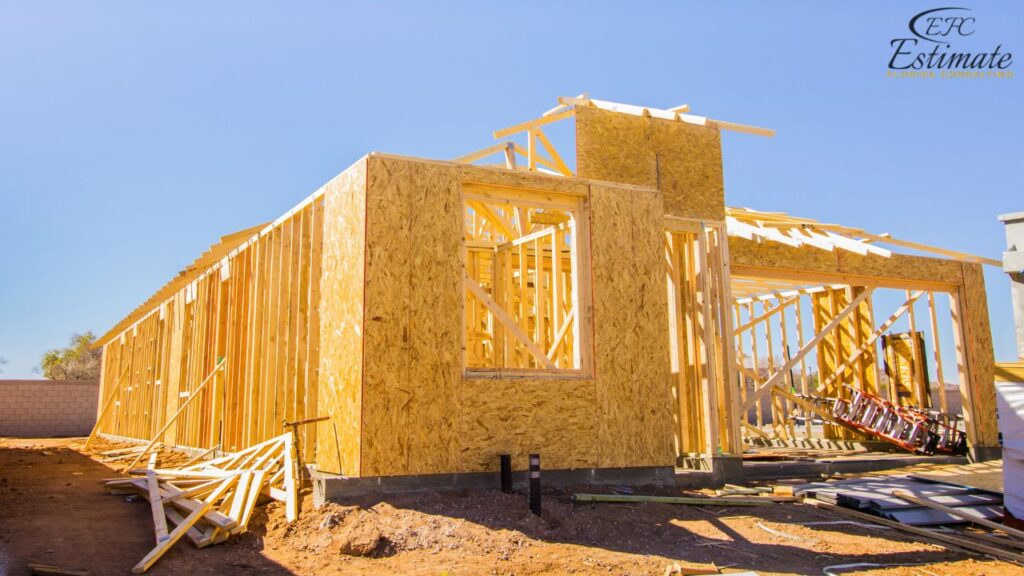
Quality and Grade
The quality and grade of the lumber are key determinants of its price and application. Higher-grade lumbers, like clear and select grades, feature a more uniform appearance with fewer defects, making them suitable for fine woodworking and interior finishes. Conversely, lower grades are more budget-friendly but may have more imperfections, fitting for structural framing purposes. Selecting the appropriate grade is essential to ensure the lumber meets the project’s performance needs while aligning with budget limitations.
Market Fluctuations
Lumber prices are subject to changes driven by global and local market conditions, including trade policies and seasonal demand. Economic trends and changes in regulations can significantly impact lumber costs. Contractors and builders in Jacksonville need to stay updated on these dynamics and adjust their project estimates accordingly. Maintaining good relationships with suppliers and keeping an eye on market trends can help in navigating these fluctuations and managing financial risks effectively.
- Multi-Family Building
- Hotel Building
- Hospital Building
- Warehouse Building
- High-Rise Building
- Shopping Complex
Size and Dimensions
The specific size and dimensions of the lumber also influence its cost and suitability for different projects. Standard lumber sizes, such as 2x4s, are generally more cost-effective and are commonly used in framing. Custom or non-standard sizes may attract higher prices due to the additional processing required. Therefore, balancing the project’s dimensional requirements with budget considerations is key to achieving both efficiency and cost-effectiveness. This balance necessitates thoughtful planning and strategic sourcing of materials.
Wood Trim Cost by Style
it’s essential to recognize the diverse array of styles available in wood trim, catering to various architectural preferences and home styles. From simple and modern to historical and intricate designs, there’s a trim style to accentuate any home’s unique architecture. These styles are offered in both paint-grade and stain-grade options, available in a range of sizes and materials. Homeowners have the flexibility to choose from dark or light wood tones or opt for trim that can be painted to match the color scheme of their choice. By understanding the versatility of trim styles and materials, accurate cost estimations can be provided to meet the needs and preferences of homeowners for their lumber-related projects.
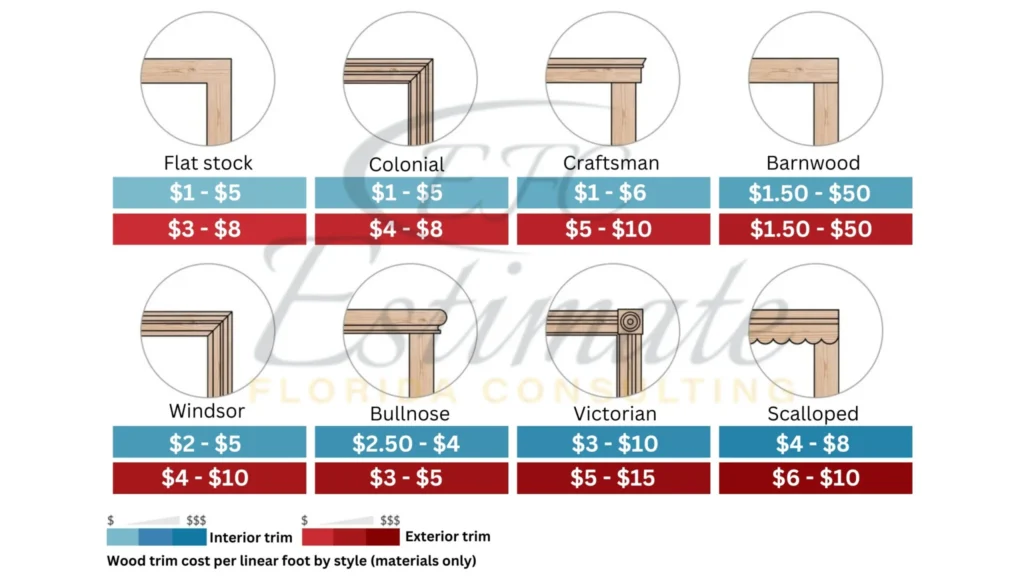
| Style | Interior Trim Cost per Linear Foot (Materials Only) | Exterior Trim Cost per Linear Foot (Materials Only) |
|---|---|---|
| Flat Stock | $1 – $5 | $3 – $8 |
| Colonial | $1 – $5 | $4 – $8 |
| Craftsman | $1 – $6 | $5 – $10 |
| Barnwood | $1.50 – $50 | $1.50 – $50 |
| Windsor | $2 – $5 | $4 – $10 |
| Bullnose | $2.50 – $4 | $3 – $5 |
| Victorian | $3 – $10 | $5 – $15 |
| Scalloped | $4 – $8 | $6 – $10 |
Download Template For Lumber Project Breakdown
- Materials list updated to the zip code
- Fast delivery
- Data base of general contractors and sub-contractors
- Local estimators

Lumber Videos
Pole Barn Construction
House Building
Building a bARNDOOR
Common Challenges and Solutions
Regulatory Compliance
Meeting regulatory requirements, including zoning laws, environmental regulations, and building codes, can pose significant challenges and affect project timelines and costs.
Solution: Conduct thorough research on local regulations, engage with regulatory authorities early in the project planning phase, and allocate resources for compliance measures to avoid delays and penalties.
Environmental Factors
Environmental factors, including weather conditions, natural disasters, and ecological concerns, can affect lumber availability, transportation, and project scheduling.
Solution: Develop contingency plans for adverse weather events, implement sustainable practices to minimize environmental impact, and leverage technology for accurate weather forecasting to mitigate risks associated with environmental factors.
Lumber prices in Jacksonville can be highly volatile due to market demand, supply chain disruptions, and economic factors, making accurate cost estimation challenging.
Solution: Implement real-time monitoring of lumber prices, establish relationships with reliable suppliers for price stability, and incorporate contingency buffers in cost estimates to accommodate price fluctuations.
Labor Shortages
Jacksonville may face labor shortages in the construction industry, leading to delays and increased labor costs for the Lumber Cost Estimator project.
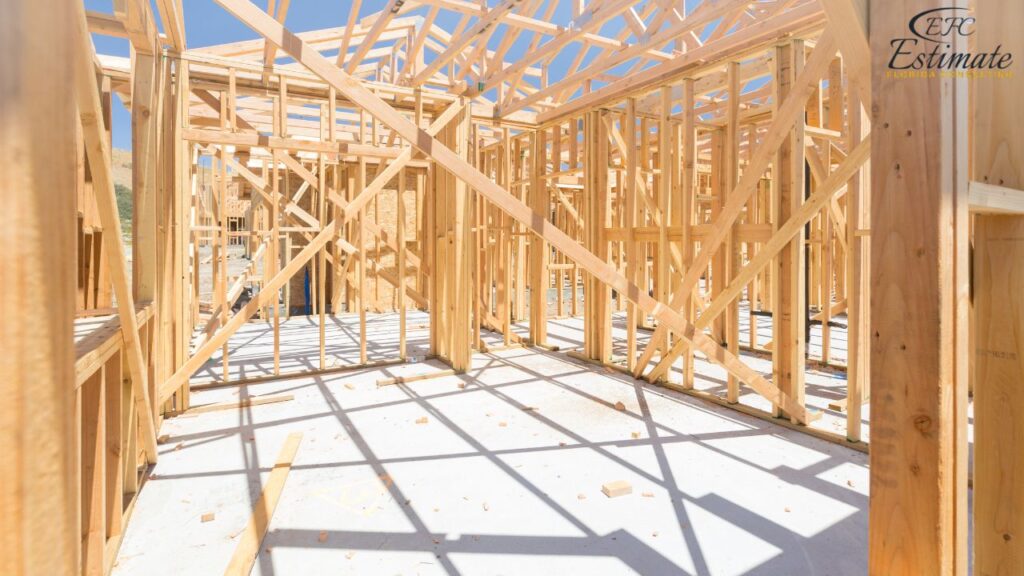
Solution: Utilize workforce management strategies such as cross-training, subcontracting, or hiring temporary labor to address shortages. Prioritize communication and collaboration to ensure efficient utilization of available labor resources.
Supply Chain Disruptions
Supply chain disruptions, such as transportation delays, material shortages, or geopolitical factors, can impact the availability and cost of lumber for the project.
Solution: Diversify suppliers and sourcing locations to mitigate supply chain risks. Maintain open communication with suppliers and monitor global trends to anticipate and address potential disruptions promptly.
Business Finance Loan
Find out if you're pre-qualified in seconds

Get Prequalified Now
IMPORTANT: Make sure the email and phone number you enter are correct. We will email and text you a link to get started.
Horizontal Wood Siding vs Vertical Wood Siding Cost
As a Lumber Cost Estimator, it’s crucial to consider both stylistic and structural factors when choosing between horizontal and vertical wood siding. While horizontal siding boasts ease of installation and widespread availability, vertical siding offers a unique appearance and enhanced durability. However, finding professionals experienced in vertical siding installation may be more challenging due to its less common usage. Vertical siding’s superior water runoff capabilities contribute to its increased durability compared to horizontal siding, which may trap moisture along its edges. Assessing these factors guides homeowners in making informed decisions about their siding options.
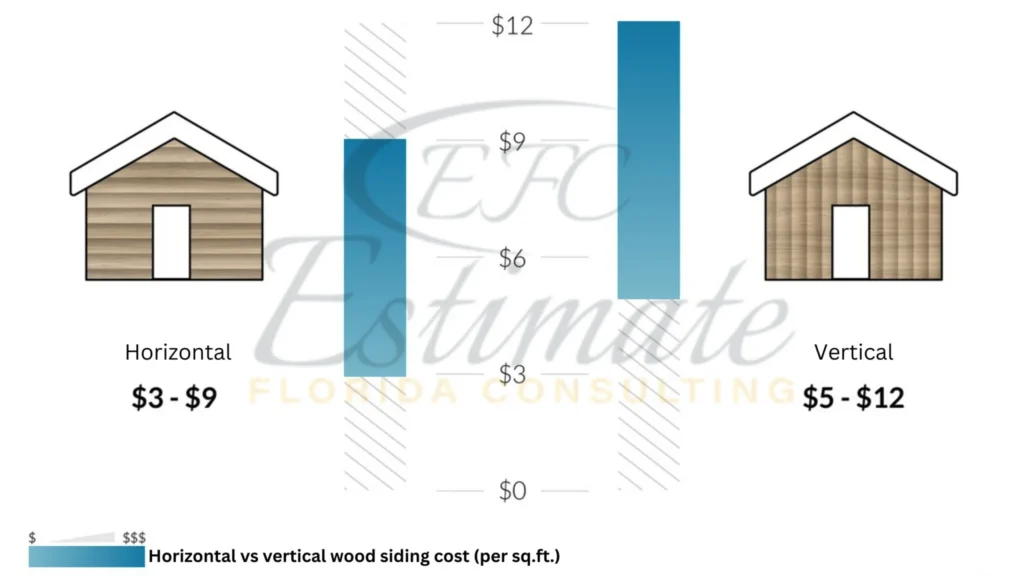
| Type | Cost per Sq.Ft. (Installed) |
|---|---|
| Horizontal | $3 – $9 |
| Vertical | $5 – $12 |
Steps in the Lumber Cost Estimator in Jacksonville
The Lumber Cost Estimator in Jacksonville streamlines pricing calculations by integrating market data and algorithms. Users input parameters like dimensions and wood type, generating accurate cost estimates. Continuous updates ensure pricing precision, aiding in efficient budgeting and project planning.
Algorithmic Calculations
Advanced algorithms are employed to process the user-input parameters and match them with the relevant lumber price data. These algorithms factor in variables such as market trends, wood grades, and regional variations to generate precise cost estimations.
Real-Time Updates and Adjustments
The estimator continuously monitors market changes and updates its database in real-time. This ensures that cost estimates remain current and reflective of the latest lumber prices, enabling users to make informed decisions and adjust budgets accordingly.
Output and Reporting
Once calculations are complete, the estimator provides users with detailed cost breakdowns and reports. This includes itemized lists of materials, labor costs, and total project expenses, empowering users with comprehensive insights for budget planning and project management.
Need Template For Your Lumber Business
We provide services for Brochure, Banner, Business Card, Envelope, Invoice, etc.

Data Collection and Analysis
The process begins with gathering data on lumber prices from various sources, including local suppliers, industry reports, and online databases. This data undergoes rigorous analysis to identify trends and fluctuations, ensuring accurate cost estimations.
User Input and Parameters
Users input project specifications such as dimensions, wood types, and quantities into the estimator. These parameters serve as the basis for calculations, allowing the system to tailor cost estimates to the specific needs of each project.
Lumber Sourcing: Local vs. Imported
Understanding the nuances of lumber sourcing – whether local or imported – is crucial for making informed decisions in construction and woodworking projects.
Advantages of Local Sourcing
Local lumber sourcing offers several tangible benefits. Key among these is the reduction in transportation costs. Since the lumber is sourced from closer locations, it significantly cuts down on freight expenses, which can lead to overall cost savings in your project budget. Additionally, sourcing lumber locally has environmental benefits due to reduced transportation emissions. Another major advantage is the boost to the regional economy; buying local supports Jacksonville lumber mills and suppliers, promoting job growth and economic stability within the community. Local sourcing also often results in quicker delivery times, as the logistics are less complicated compared to long-distance shipping.
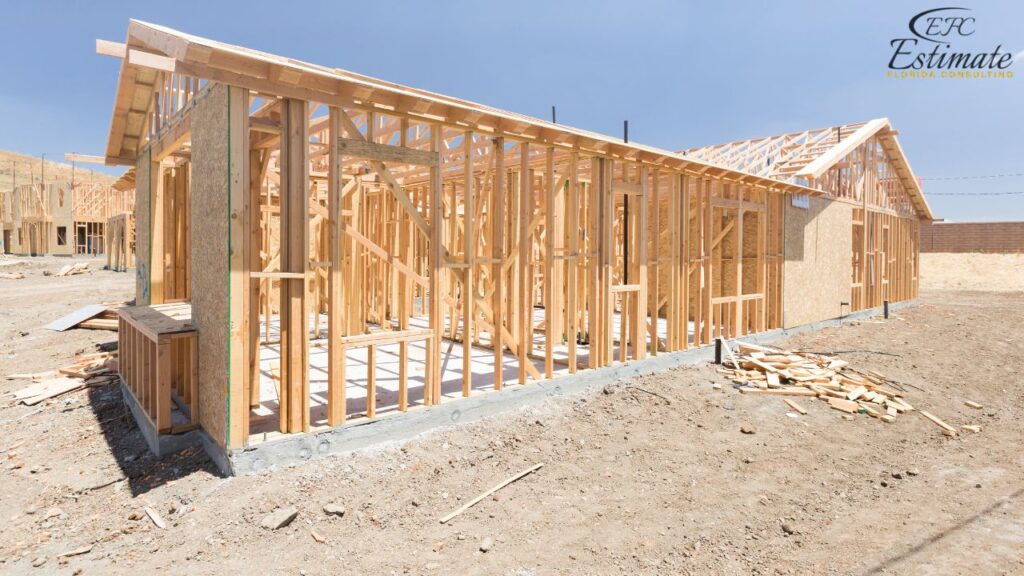
This can be a critical factor in keeping construction or renovation projects on schedule.
Considerations for Imported Lumber
On the flip side, imported lumber can offer access to unique wood types and potentially lower costs due to global market dynamics. However, there are several considerations. Import tariffs and duties can substantially increase the overall cost, making the imported lumber less cost-effective than initially perceived. These additional costs need to be factored into the project’s budget. Furthermore, the lead times for imported lumber can be significantly longer. The process of international shipping, including transit and customs clearance, can introduce delays, potentially impacting project schedules in Jacksonville. Environmental considerations also come into play, as the carbon footprint of transporting lumber over long distances can be substantial. Lastly, the sustainability and harvesting practices in the source country should be considered, as these can vary greatly and impact the environmental impact of the lumber used.
Eco-Friendly Lumber Options
Embracing eco-friendly lumber options can significantly contribute to sustainability and environmental conservation.
Sustainable Wood Choices
Choosing lumber from forests managed sustainably and certified by organizations like the Forest Stewardship Council (FSC) is an environmentally responsible option. Although these sustainable choices might be more expensive upfront compared to traditional lumber, the long-term environmental benefits are substantial. By opting for FSC-certified lumber, you’re supporting forest health, biodiversity preservation, and the rights of indigenous communities. Additionally, sustainably managed forests are vital in combating climate change through carbon sequestration and promoting soil and water conservation.
Are You Looking For?
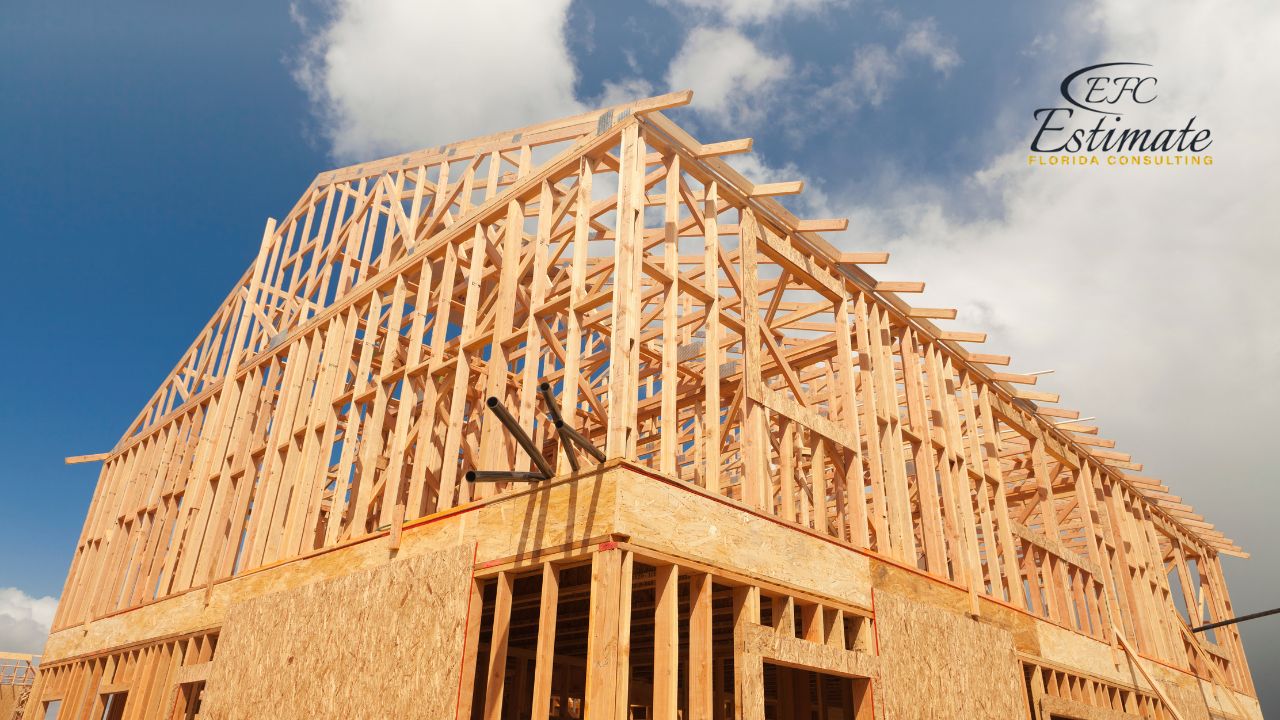
Fully Insured License Hire Subcontractor For Lumber Work
Hire ContractorCall Us To Discuss More at 561-530-2845
Reclaimed Wood
Incorporating reclaimed or recycled wood in construction projects offers both environmental benefits and unique aesthetic appeal. This type of wood, sourced from old structures like barns or warehouses, provides an eco-friendly alternative by repurposing existing materials, thus reducing landfill waste and decreasing the demand for new timber. The cost of reclaimed lumber varies, influenced by factors such as rarity, condition, and historical value. While some reclaimed wood can be pricier due to its unique features or historical importance, there are also more budget-friendly options available. Reclaimed wood not only aids in environmental conservation but also enhances the aesthetic quality of a space, adding warmth, character, and a rich sense of history to both interiors and exteriors.
Conclusion
The Lumber Cost Estimator in Jacksonville represents a pivotal advancement in the realm of construction project planning and budgeting. By harnessing robust data collection methods, advanced algorithms, and real-time updates, this innovative tool provides users with unparalleled accuracy and efficiency in estimating lumber costs. Its user-friendly interface and customizable features ensure accessibility for both novice and experienced users, enhancing overall usability. Furthermore, the integration of market analysis and predictive modeling enables proactive decision-making, empowering stakeholders to anticipate and adapt to changes in lumber prices effectively. As a result, the Lumber Cost Estimator in Jacksonville not only streamlines the estimation process but also serves as a valuable asset for optimizing resource allocation, mitigating risks, and ultimately driving success in construction projects within the Jacksonville area and beyond.
We Provide Services for Other Trades in Jacksonville
FAQs
Lumber prices in Jacksonville are influenced by various factors such as market demand, supply chain disruptions, seasonal fluctuations, and regional economic conditions. Additionally, factors like transportation costs, tariffs, and environmental regulations can impact lumber prices in the area.
We ensure accurate cost estimates by conducting thorough material requirements analysis, researching market prices, utilizing reliable cost estimation tools, and considering project-specific variables such as size, complexity, and timeline. Regular monitoring of market trends and adjustments to estimates as needed also contribute to accuracy.
The lumber cost estimation process involves defining the project scope, analyzing material requirements, conducting market research, calculating cost estimates, and reviewing and adjusting estimates based on feedback and changing circumstances. Each step is essential for generating accurate and reliable cost projections.
To address fluctuations in lumber prices, we employ strategies such as establishing relationships with reliable suppliers, monitoring market trends regularly, incorporating contingency buffers in cost estimates, and considering alternative materials or sourcing options when feasible. Effective communication with clients and stakeholders is also key to managing expectations.
We ensure compliance with local regulations in Jacksonville by conducting thorough research on zoning laws, building codes, and environmental regulations. We work closely with regulatory authorities, engage in regular updates on legal requirements, and incorporate necessary permits and approvals into project plans to ensure adherence to all relevant regulations.
Process To Get Lumber Cost Estimate Report
Here I am going to share some steps to get your lumber cost estimate report.
-
You need to send your plan to us.
You can send us your plan on info@estimatorflorida.com
-
You receive a quote for your project.
Before starting your project, we send you a quote for your service. That quote will have detailed information about your project. Here you will get information about the size, difficulty, complexity and bid date when determining pricing.
-
Get Estimate Report
Our team will takeoff and estimate your project. When we deliver you’ll receive a PDF and an Excel file of your estimate. We can also offer construction lead generation services for the jobs you’d like to pursue further.
Google Reviews



Reach Out To Us
Places to visit if you new in Jacksonville
Catty Shack Ranch Wildlife Sanctuary
Catty Shack Ranch Wildlife Sanctuary operates as a 501(c)(3) non-profit, dedicated to offering a secure and caring forever home to endangered big cats while raising awareness about their challenges both in the wild and in captivity. Here they strictly adhere to a policy of not engaging in breeding, selling, or trading any of their animal residents. Presently, our sanctuary provides a haven for various species including tigers, lions, leopards, pumas, servals, bobcats, foxes, and coatimundis.
Covering 73 acres, Jacksonville Zoo and Gardens stands as the sole zoo in Florida’s northeast region. Housing a diverse population of over 2000 animals and nurturing 1000 plants, it distinguishes itself as one of only seven zoos in the United States boasting an animal wellness team. This dedicated team ensures the provision of optimal care for our animal residents, prioritizing their well-being above all else.
The Cummer Museum of Art & Gardens
Established on November 10, 1961, the Cummer Museum of Art & Gardens originated from the residence of Arthur and Ninah Cummer. Initially, Ninah Cummer’s modest collection of sixty pieces laid the foundation for the museum. Since then, the museum’s permanent collection has flourished, expanding to over six thousand works of art spanning a remarkable eight thousand years of art history.
Big Talbot Island State Park, Jacksonville Florida’s coast, boasts stunning natural beauty and diverse ecosystems. Visitors are drawn to its expansive salt marshes, pristine beaches, and unique coastal dune habitats. The park is renowned for its striking “boneyard beach,” adorned with weathered skeletons of trees shaped by the elements.

